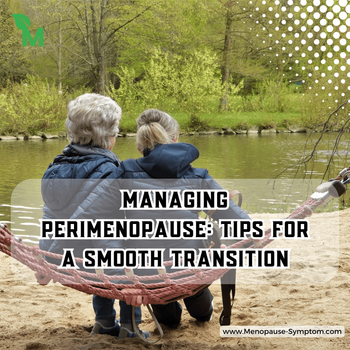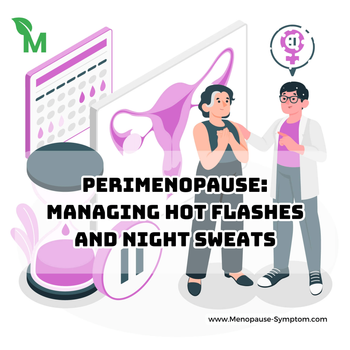1. Are You Aware of the Perimenopause-Related Changes to Your Body?
The perimenopause is a crucial phase in a woman's life that is frequently ignored until symptoms manifest. To be ready for the changes their bodies are going through or will go through, women should be aware of the perimenopause stage.
This phase can last for several years prior to the official onset of menopause and typically starts in a woman's 30s or 50s. Hormonal changes during the perimenopause can cause mood swings, irregular periods, and increased desire for sexual activity, among other physical and emotional changes. Acknowledging these symptoms as perimenopausal symptoms can empower women to take a more proactive approach to their healthcare..
2. Women can use this time to reflect on their health, lifestyle and overall well-being.
Some of the unpleasant symptoms of perimenopause can be greatly reduced by practicing stress management strategies, eating a healthy, balanced diet, and getting regular exercise.
Hormonal fluctuations during the perimenopause can cause a range of symptoms, including insomnia, night sweats, and hot flashes. Although these symptoms might be uncomfortable, women can manage them better if they know that they are a typical aspect of the perimenopause phase. Many women find relief by altering their diets, sleeping schedules, and using natural therapies.
Examples:
· Including foods high in phytoestrogens, such beans, flaxseed, and soy, in your diet will help regulate hormones..
· Exercising regularly can improve mood and energy levels, making the perimenopause experience more manageable.
Another important aspect of perimenopause is the emotional and psychological changes that can occur. Mood swings, anxiety, and irritability are common during this time due to changing hormone levels. Women should not hesitate to seek support from friends, family, or professionals during this time.
Communicating openly about perimenopause concerns can promote understanding and create a supportive environment. Engaging in mindfulness activities, such as yoga and meditation, can also help with emotional stability and overall well-being.
As women go through perimenopause, their reproductive health will also change a lot. It is important to stay informed about these changes and consult a doctor or specialist for regular health checks. Understanding your body and its needs during perimenopause can help improve your health and well-being through this period.
Women may experience changes in their menstrual cycle, including irregular periods or heavier bleeding, which can be worrying. However, these changes are often typical of perimenopause. Keeping a diary to track symptoms and menstrual cycles can provide valuable insights when it comes to health checks.
3. Finding new interests and hobbies can be a part of accepting the perimenopause journey.
For many women, this is a special time in life to concentrate on self-improvement and self-care. Engaging in new activities during perimenopause, such as learning a new skill or activity, or just having time to unwind, might improve one's quality of life. Women who prioritize self-care can develop a positive outlook and confidently accept the changes in their bodies.
4. Nutrition is crucial for controlling the symptoms of the perimenopause.
Energy and mood can be stabilized with a well-balanced diet full of nutritious foods, such as fruits, vegetables, whole grains, and lean meats.
Staying hydrated is also important, as dehydration can worsen symptoms like fatigue and irritability. Some women may also find it helpful to discuss dietary supplements with their healthcare providers, as certain vitamins and minerals can help support hormonal balance during perimenopause.
5. Changes in Sex Life
In addition to physical and emotional changes, perimenopause can also affect a woman's sex life. Many women experience changes in sexual desire and vaginal dryness. To maintain intimacy with your partner, it is important to talk openly about these changes. You can try different ways of being intimate and use moisturizers or lubricants to improve your sex life.
This does not mean the end of a happy sex life. On the contrary, it can be an opportunity to redefine intimacy.
To overcome the difficulties of perimenopause, it is important to build a support system. Talking to other women who have gone through the same experience can help you feel comfortable and reassured. Social networks, online forums, and support groups are places to share experiences. You can also consult a women's health professional for specific advice on how to manage symptoms and improve your overall health.
In Summary
Perimenopause is a natural and transformative phase in a woman’s life that deserves attention and understanding. By educating themselves about perimenopause, women can embrace their changing bodies with confidence and grace.
This journey can present challenges, but it also presents opportunities for growth, self-discovery, and self-discovery. By prioritizing health, nurturing emotional well-being, and fostering supportive relationships, women can navigate perimenopause with resilience and positivity. Accepting this phase can lead to a deeper understanding of ourselves and a greater appreciation for our journey as women.
Source: Team MPS compiled, analyzed and wrote. Please dont reup without source. Many thanks.

Managing Perimenopause: Tips For A Smooth Transition
Invalid Date

Perimenopause: A Guide To Healthy Aging
09.02.2024
Perimenopause is an important transitional stage in every woman's life, marking the time when the body begins to change hormones.

Perimenopause: Managing Hot Flashes And Night Sweats
09.02.2024
Perimenopause is a natural stage in a woman's life, usually starting around age 40 to 50. This is when the body begins to experience hormonal changes, leading to a variety of uncomfortable symptoms, the most prominent of which are hot flashes and night sweats.
